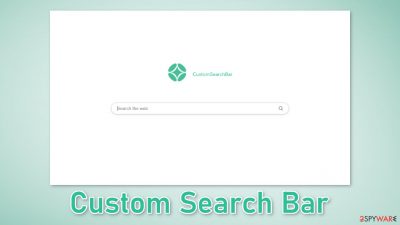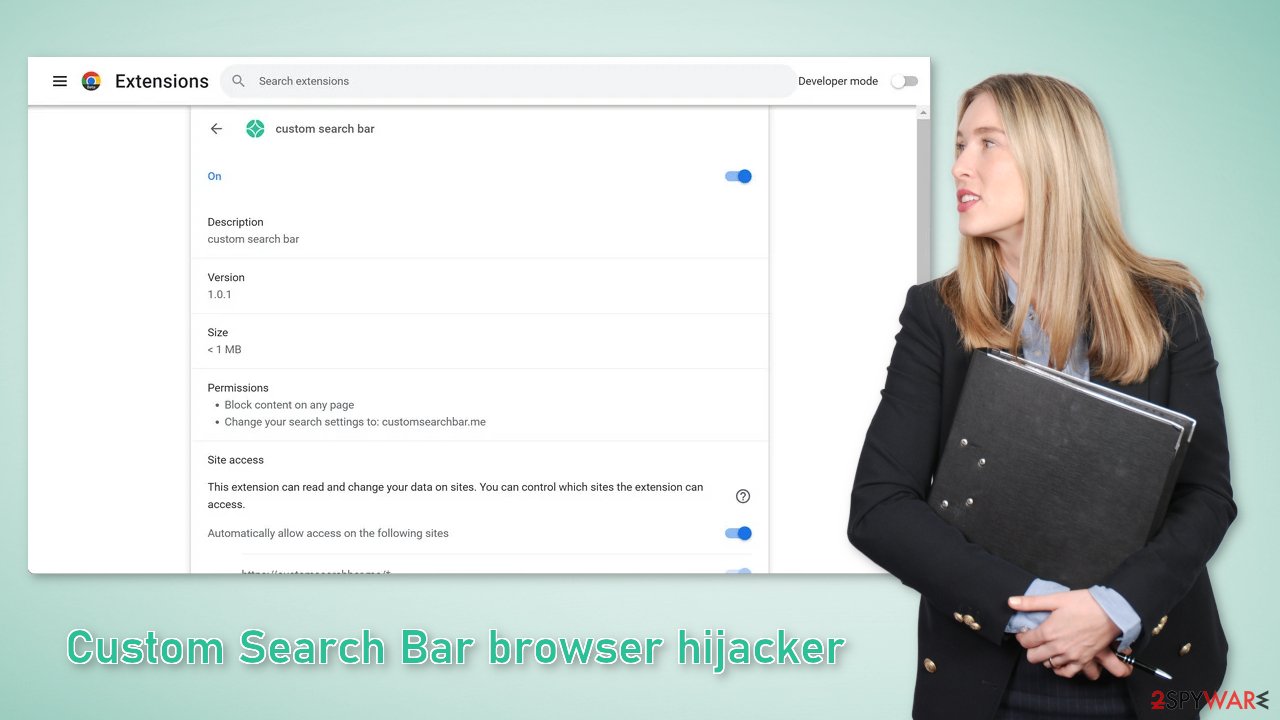Custom Search Bar browser hijacker (virus) - Free Instructions
Custom Search Bar browser hijacker Removal Guide
What is Custom Search Bar browser hijacker?
Custom Search Bar is a bogus browser extension that manipulates the main settings

Custom Search Bar is a browser hijacker, which means it can change the main settings, like the homepage, new tab address, and search engine. It forces people to use only selected channels for browsing which raises many user privacy and security concerns.
The main purpose of browser hijackers is to monetize user activity. This can be done in various ways. Crooks can inject ads in the form of pop-ups, banners, and redirects. They can also track users' browsing activities. They may also use rogue advertising networks that place ads leading to dangerous websites.
As a result, people can end up on scam pages that try to trick them into providing personal information, downloading PUPs (potentially unwanted programs),[1] and even malware. Users might see ads promoting bogus antivirus offers, fake surveys, and giveaways.
| NAME | Custom Search Bar |
| TYPE | Browser hijacker; potentially unwanted program |
| SYMPTOMS | The main settings of the browser get changed like the homepage, new tab address, and search engine |
| DISTRIBUTION | Shady websites, deceptive ads, software bundling |
| DANGERS | The application could possibly collect data about users' browsing activity as well as change the search results that they see |
| ELIMINATION | You can remove browser extensions via settings; a scan with anti-malware tools is recommended |
| FURTHER STEPS | After elimination is complete, use FortectIntego to get rid of any remaining damage and optimize your machine |
Distribution methods
There are many ways that fraudsters spread hijackers online. Most of the time, plugins such as Custom Search Bar are found through fake download pages and deceptive ads. People rarely stumble on these sites through search results. Users get redirected to them from other shady websites.
Avoid visiting pages that engage in illegal activities, like illegal streaming platforms. They are unregulated, so they are full of deceptive ads, and sneaky redirects. Try not to visit sites that you do not know, or click on random advertisements. Especially be careful of fake “Download” and “Play” buttons.[2]
You should always use official web stores if you want to download browser extensions. Apps that get listed there, go through an extensive review process. However, you should still do your research – read the reviews, look at the ratings, and the number of users.
Avoid freeware installations
PUPs are most often installed from freeware distribution sites. They earn money with bundled software.[3] Additional programs are included in the installers without disclosing it clearly on the page. Crooks hope that most people will not notice. Unfortunately, that is exactly what happens most of the time. People rush through the installation process and skip important steps.
If you want to avoid this happening in the future, you should always choose the “Custom” or “Advanced” installation method, read the Privacy Policy, and Terms of Use. The most important part is to inspect the file list and uncheck the boxes next to any unrelated programs that you do not need.
Remove the unwanted plugin

First, locate Custom Search Bar in your browser settings, remove it and see if that helps. You can do it via browser settings:
Google Chrome
- Open Google Chrome, click on the Menu (three vertical dots at the top-right corner) and select More tools > Extensions.
- In the newly opened window, you will see all the installed extensions. Uninstall all the suspicious plugins that might be related to the unwanted program by clicking Remove.
![Remove extensions from Chrome Remove extensions from Chrome]()
MS Edge:
- Select Menu (three horizontal dots at the top-right of the browser window) and pick Extensions.
- From the list, pick the extension and click on the Gear icon.
- Click on Uninstall at the bottom.
![Remove extensions from Edge Remove extensions from Edge]()
MS Edge (Chromium)
- Open Edge and click select Settings > Extensions.
- Delete unwanted extensions by clicking Remove.
![Remove extensions from Chromium Edge Remove extensions from Chromium Edge]()
Mozilla Firefox
- Open Mozilla Firefox browser and click on the Menu (three horizontal lines at the top-right of the window).
- Select Add-ons.
- In here, select unwanted plugin and click Remove.
![Remove extensions from Firefox Remove extensions from Firefox]()
Safari
- Click Safari > Preferences…
- In the new window, pick Extensions.
- Select the unwanted extension and select Uninstall.
![Remove extensions from Safari Remove extensions from Safari]()
Clear your browsers
The next thing you should do is endure that your browsing data is safe. You can do that by deleting cookies[4] – small data files that contain information, like your IP address, geolocation, websites you visit, links you click on, and things you purchase online. By deleting cookies, you will stop the tracking and eliminate any already collected information.
For this task, it is best to use a maintenance tool like FortectIntego. It can do all this automatically with a click of a button. Besides, this powerful software can fix various system errors, corrupted files, registry issues, which is especially helpful after a virus infection.
Scan your machine with professional security software
If you tried the first removal method, but it did not help and the settings changed back again, this is definitely a sign of a PUA hiding in your system. In that case, the application will keep messing up your browser until you completely remove it from your PC. Identifying the program responsible for hijacking your browser might be difficult if you have never done this before.
The program could be disguised as antivirus, video, or image editing software. If you do not want to risk deleting the wrong files, we suggest using SpyHunter 5Combo Cleaner or Malwarebytes professional security tools that will scan your machine, eliminate it, and prevent such infections in the future by giving you a warning before a PUP can make any changes. If manual removal is what you still prefer, we have instructions for Windows and Mac machines:
Windows 10/8:
- Enter Control Panel into Windows search box and hit Enter or click on the search result.
- Under Programs, select Uninstall a program.
![Uninstall from Windows 1 Uninstall from Windows 1]()
- From the list, find the entry of the suspicious program.
- Right-click on the application and select Uninstall.
- If User Account Control shows up, click Yes.
- Wait till uninstallation process is complete and click OK.
![Uninstall from Windows 2 Uninstall from Windows 2]()
Windows 7/XP:
- Click on Windows Start > Control Panel located on the right pane (if you are Windows XP user, click on Add/Remove Programs).
- In Control Panel, select Programs > Uninstall a program.
![Uninstall from Windows 7/XP Uninstall from Windows 7/XP]()
- Pick the unwanted application by clicking on it once.
- At the top, click Uninstall/Change.
- In the confirmation prompt, pick Yes.
- Click OK once the removal process is finished.
Mac:
- From the menu bar, select Go > Applications.
- In the Applications folder, look for all related entries.
- Click on the app and drag it to Trash (or right-click and pick Move to Trash)
![Uninstall from Mac 1 Uninstall from Mac 1]()
To fully remove an unwanted app, you need to access Application Support, LaunchAgents, and LaunchDaemons folders and delete relevant files:
- Select Go > Go to Folder.
- Enter /Library/Application Support and click Go or press Enter.
- In the Application Support folder, look for any dubious entries and then delete them.
- Now enter /Library/LaunchAgents and /Library/LaunchDaemons folders the same way and terminate all the related .plist files.
![Uninstall from Mac 2 Uninstall from Mac 2]()
How to prevent from getting browser hijacker
Choose a proper web browser and improve your safety with a VPN tool
Online spying has got momentum in recent years and people are getting more and more interested in how to protect their privacy online. One of the basic means to add a layer of security – choose the most private and secure web browser. Although web browsers can't grant full privacy protection and security, some of them are much better at sandboxing, HTTPS upgrading, active content blocking, tracking blocking, phishing protection, and similar privacy-oriented features. However, if you want true anonymity, we suggest you employ a powerful Private Internet Access VPN – it can encrypt all the traffic that comes and goes out of your computer, preventing tracking completely.
Lost your files? Use data recovery software
While some files located on any computer are replaceable or useless, others can be extremely valuable. Family photos, work documents, school projects – these are types of files that we don't want to lose. Unfortunately, there are many ways how unexpected data loss can occur: power cuts, Blue Screen of Death errors, hardware failures, crypto-malware attack, or even accidental deletion.
To ensure that all the files remain intact, you should prepare regular data backups. You can choose cloud-based or physical copies you could restore from later in case of a disaster. If your backups were lost as well or you never bothered to prepare any, Data Recovery Pro can be your only hope to retrieve your invaluable files.
- ^ Potentially unwanted program. Wikipedia. The free encyclopedia.
- ^ Andy Maxwell. Google Targets Fake ‘Download’ and ‘Play’ Buttons. Torrentfreak. Filesharing News.
- ^ Will Dormann. Bundled Software and Attack Surface. Insights. Carnegie Mellon University Blog.
- ^ Dusan Vasic. What Are Cookies? The Good and the Bad of Browser Cookies. Dataprot. Cybersecurity Blog.










